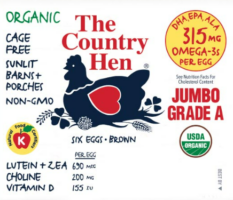Country Hen

| Rating |  |
| Farm/Brand Headquarters | Hubbardston, MA |
| Website | http://www.countryhen.com/ |
| Market Area | Nationwide |
| Total Score | 210 |
Country Hen supplies eggs to Whole Foods and other major grocery chains.
Brands with this rating are generally produced on industrial-scale operations that grant no meaningful outdoor access. This brand lacks transparency with both Cornucopia’s investigators and the public at large. While “greenwashing” and “humanewashing” may occur in the brand’s marketing, the information they provide is often misleading.
No producers in this category were willing to participate in Cornucopia’s research and reliable information was difficult for our investigators to find. In general, industrial-organic brands prefer to keep their practices in the dark.
If you are a customer of this brand, we encourage you contact the brand owners and ask them to participate fully in Cornucopia’s research. We always want the most accurate and up-to-date information on our scorecards, and consumers play an important role by demanding transparency from their food suppliers.
| Criteria | Points | Comment |
|---|---|---|
| TOTAL (possible score is 1700) | 210 | 1-egg  |
|
Brands that have close daily control over their egg production receive the most points. Ownership Structure | 0 | Investor owned, produces some of their own eggs and buys from others |
|
Brands that only produce organic products make the biggest investments — in time and money — in systems that benefit us all. Eggs sourced from a single operation receive the most points. Eggs of unclear origins and/or with poor oversight receives the fewest points. Commitment to Organic Label | 75 | An industrial-organic brand, but only producing organic products |
|
Additional certifications, depending on the credibility of the label, can demonstrate a commitment beyond the organic standards. Other Labels and Standards | 40 | Certified Humane (either pasture raised or cage free) |
|
Smaller flock sizes (the number of laying hens per housing structure) offer better animal welfare conditions. Flock Size(s) | 0 | Large flock sizes, likely exceeding 20k birds per house |
|
The best housing offers space for natural behaviors and legitimate access to the outdoors through adequate exits. Hen Housing and Exit Areas | 25 | Fixed housing both single and aviary style; all hens cannot be outdoors at same time |
|
Adequate indoor spacing reduces stress and disease. With less crowding, birds can stretch their wings and more easily perform other natural behaviors. Indoor Spacing | 20 | Minimum of 1.2 square feet per hen (due to Certified Humane) |
|
High scoring brands provide enough space to allow each hen to fully utilize their outdoor area, and to perform instinctive behaviors without harming the environment. Outdoor Spacing | 25 | Poor outdoor spacing, unless under Certified Humane's pastured requirements |
|
High quality outdoor access includes vegetation, soil, and ample opportunities to forage year-round. Quality of Outdoor Access | 0 | Outdoor access is illegitimate, with the majority provided by porches or small strips alongside massive barns |
|
Birds that are introduced to the outdoors early are more accustomed to spending time outdoors without fear or stress. Outdoor Access Timing | 0 | No answer/information not confirmed |
|
Year-round access to perches, scratching areas, deep litter, novel foodstuffs, and dust bathing contribute to quality of life. Enrichments | 0 | No meaningful enrichments indoors or out |
|
Chickens use their beaks to interact with the world. Authentic organic farmers account for this behavior, eschewing beak trimming. Alterations | 0 | Severe beak tipping/de-beaking may be performed, unknown whether forced molting is done |
|
Raising chicks on farm or buying them from certified organic hatcheries shows dedication to organic production from start to finish. Chicks and Pullets | 0 | No answer/information not confirmed |
|
Brands that have low rates of deaths and utilize their spent hens for human consumption or similar score the highest. Deaths, Culls, and Spent Hens | 0 | No answer/information not confirmed |
|
Brands that closely monitor and manage health of soil, native species, and water quality receive the most points. Environmental Impacts | 0 | May have severe negative environmental impacts |
| Feed Sourcing | 0 | Sourcing unknown, likely not domestic and possibly fraudulent organic grain |
|
Brands that score well here go above and beyond to ensure the highest animal welfare, taking into consideration their hens’ safety and cleanliness, natural behavior, and stress levels. Animal Welfare | 25 | Unclear animal welfare benchmarks, Certified Humane offers minimal assurances |
|
Cornucopia believes you have a right to transparency. Top brands share information with Cornucopia via a survey and cooperate with our own independent investigations. Transparency | 0 | No transparency, industrial brand |
| Soy free and/or gluten free? (non-scoring) | Some products may be soy-free, check packaging | |
|
Brands do not receive points, but are invited to submit the name of their Accredited Organic Certifier (suppliers may have different certifiers). Organic Certifier (non-scoring) | No answer/information not confirmed | |
|
Extra credit is offered for various practices that go above-and-beyond in some form. Extra Credit | 0 | None |

